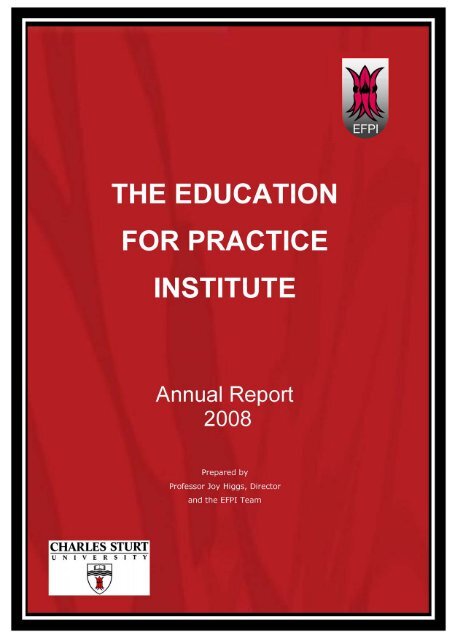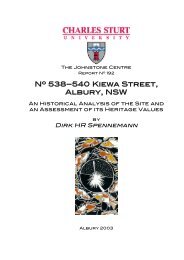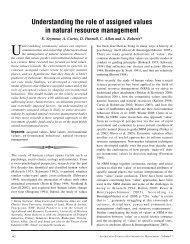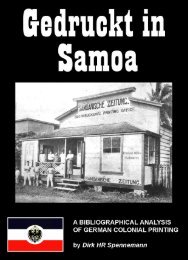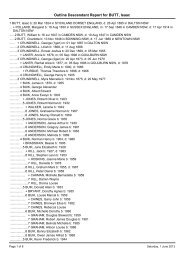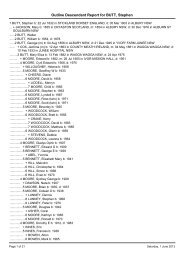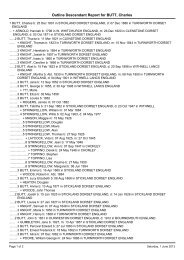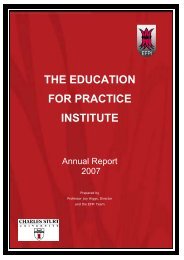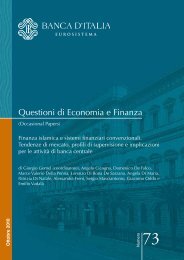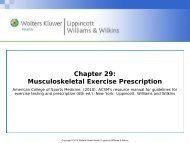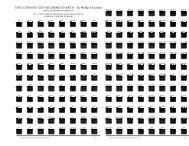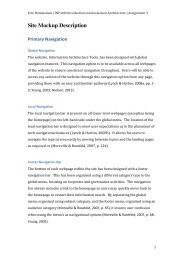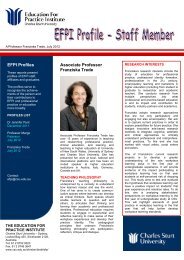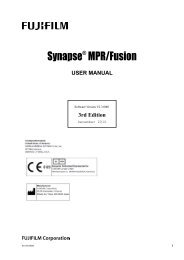2008 initiative - Life - Charles Sturt University
2008 initiative - Life - Charles Sturt University
2008 initiative - Life - Charles Sturt University
Create successful ePaper yourself
Turn your PDF publications into a flip-book with our unique Google optimized e-Paper software.
CONTENTS<br />
Reference: Higgs J and the EFPI Team (2009), The<br />
Education for Practice Annual Report <strong>2008</strong>, The<br />
Education for Practice Institute, <strong>Charles</strong> <strong>Sturt</strong> <strong>University</strong>,<br />
North Parramatta.<br />
Director’s Report ........................................................................................................................................2<br />
Introduction ...............................................................................................................................................3<br />
Mission and Roles ...................................................................................................................................... 3<br />
Goals of EFPI ............................................................................................................................................... 3<br />
Review of 2007 ........................................................................................................................................... 3<br />
CSU Networking.......................................................................................................................................... 4<br />
External Collaborations............................................................................................................................... 4<br />
Focus for <strong>2008</strong>‐9 ......................................................................................................................................... 4<br />
Operating Structure.................................................................................................................................... 4<br />
Staffing ...................................................................................................................................................5<br />
Staff Profile <strong>2008</strong> ........................................................................................................................................ 5<br />
Key Staff Roles ............................................................................................................................................ 6<br />
Staff Appraisal and Development ............................................................................................................... 6<br />
Adjunct Appointments................................................................................................................................ 6<br />
<strong>2008</strong> Strategic Plan and Action Framework .................................................................................................7<br />
Strategic Action Framework .......................................................................................................................8<br />
EFPI Portfolios and Project Groups............................................................................................................. 9<br />
Scholarship Portfolio Report .......................................................................................................................9<br />
Books and Chapters .................................................................................................................................... 9<br />
Papers and Conference Presentations...................................................................................................... 10<br />
Conference Presentations by EFPI Staff and Students ............................................................................. 10<br />
Research Portfolio Report......................................................................................................................... 12<br />
Research Projects and Grants................................................................................................................... 12<br />
Seed Grants............................................................................................................................................... 13<br />
ALTC Citation............................................................................................................................................. 13<br />
Consultancies............................................................................................................................................ 13<br />
Research Training Portfolio Report ........................................................................................................... 14<br />
Research Higher Degree Students ............................................................................................................ 14<br />
Training and Retreats................................................................................................................................ 14<br />
Education Portfolio Report ....................................................................................................................... 15<br />
Strategy .................................................................................................................................................... 15<br />
Education Development Projects ............................................................................................................. 15<br />
<strong>2008</strong> Initiative: Teaching Fellowships ........................................................................................................ 16<br />
<strong>2008</strong> Initiative: Global Alliances ................................................................................................................ 17<br />
CSU Global Alliance Development Scheme Awards.................................................................................. 17<br />
<strong>2008</strong> Adjunct Appointments..................................................................................................................... 17<br />
Visits and Presentations by EFPI Staff and Students................................................................................. 18<br />
Visitors to EFPI .......................................................................................................................................... 18<br />
EFPI Colloquia at CSU with Global PBPL Partners ..................................................................................... 19<br />
<strong>2008</strong> Initiative: Fieldwork Education Development ................................................................................... 21<br />
EFPI and PEN............................................................................................................................................. 21<br />
Profiling Fieldwork Education at CSU ....................................................................................................... 21<br />
Development of Fieldwork Education Programs, Policies and Infrastructure.......................................... 21<br />
EFPI Roadshow.......................................................................................................................................... 21<br />
<strong>2008</strong> Initiative: Preparing for the 2009 AUQA Audit .................................................................................. 22<br />
Appendix 1 Advisory Board ........................................................................................................ 23<br />
Appendix 2 <strong>2008</strong> Publications by the EFPI Team........................................................................ 24<br />
Appendix 3 <strong>2008</strong> Conference Presentations .............................................................................. 27<br />
Appendix 4 Seed Grants ............................................................................................................. 30<br />
Note: Several staff members working at EFPI are also members of RIPPLE (The Research Institute for Professional Practice, Learning and<br />
Education). Some of the projects reported/planned in this document are collaborative EFPI/RIPPLE projects.<br />
1
DIRECTOR’S REPORT<br />
<strong>2008</strong> was a year of expansion for The Education for Practice Institute (EFPI).<br />
In each of the Institute’s key portfolios (Research, Scholarship, Education,<br />
Research Training) substantial progress was made in pursuit of the Institute’s<br />
mission to advance the quality of practice‐based education at CSU.<br />
In the field of scholarship publications increased from 49 in 2007 to 119 in<br />
<strong>2008</strong>. Three books were published by the EFPI team and we were contracted<br />
to produce a book series for Sense Publishers around the theme of Practice,<br />
Education, Work and Society. A book currently in production in this series is<br />
titled Education for Future Practice.<br />
Primary educational targets met in <strong>2008</strong> were debates on education for<br />
practice, continued networking and working with schools and faculties,<br />
particularly in the development of fieldwork education.<br />
Multiple research projects and consultancies were conducted during <strong>2008</strong> and presentations of research<br />
findings were made at numerous conference in Australia and overseas. A highlight of the year was attendance<br />
by a group of EFPI staff and students, along with numerous CSU staff at the <strong>2008</strong> WACE (World Association for<br />
Cooperative Education) conference in Sydney. Key areas of research included fieldwork education, university<br />
clinics, fieldwork education management systems and training of fieldwork educators. EFPI’s seed grant<br />
program was successfully implemented again this year.<br />
The EFPI team has a growing number of PhD students and celebrated three graduations in <strong>2008</strong>. We welcomed<br />
four new students. Training retreats for staff and students and mentoring of new supervisors formed a large<br />
part of the research training portfolio activities. The Australian Learning and Teaching Council awarded me a<br />
citation for two decades of exemplary contributions that blend personal and research capabilities development<br />
to postgraduate research training through supervision, mentoring, group learning and scholarship.<br />
In <strong>2008</strong> the regular roles of EFPI were combined with four major <strong>initiative</strong>s:<br />
a) commencement of a teaching fellows program. This has proved to be a rewarding innovation, an excellent<br />
opportunity for staff development and a rich avenue for expanding research and development into<br />
education for practice.<br />
b) global alliances supported educational exchanges, seminars, scholarly collaborations and visits by<br />
international colleagues to CSU and by EFPI staff and students to key international centres participating in<br />
practice‐based learning. Several CSU events with international visitors showcased the role of CSU and EFPI<br />
in promoting practice‐based education.<br />
c) fieldwork education development. Extensive work commenced on profiling fieldwork education as the first<br />
stage of establishing standards and internal benchmarking around practice‐based education.<br />
d) preparation for the 2009 Australian Universities Qualities Agency (AUQA) audit, particularly around Theme<br />
2 “Professional Education and Practice‐Based Learning”.<br />
Professor Joy Higgs<br />
Director, EFPI<br />
2
INTRODUCTION<br />
The Education for Practice Institute (EFPI) pursues the advancement of practice‐based education (PBE) 1 by<br />
promoting transformative change in relation to course and staff development, policies, procedures and<br />
infrastructure, research, scholarship, discourse and educational partnerships. Education for practice or<br />
practice‐based education involves promoting the preparation and matching of graduates for the world of work<br />
in society.<br />
MISSION AND ROLES<br />
The MISSION of the Institute is to advance the quality<br />
of practice‐based education at CSU.<br />
This Mission and the EFPI strategic plan aligns with the vision of CSU as outlined in the <strong>University</strong> Strategy<br />
2007‐2011 to be a national university for excellence in a) education for the professions and other occupational<br />
groups, b) strategic and applied research and c) flexible delivery of learning and teaching.<br />
To pursue this mission EFPI acts as a change agent at three levels – within, across and beyond CSU.<br />
This involves:<br />
Creating visions about education for practice<br />
Promoting system change to enhance education for practice<br />
Fostering quality in practice‐based education<br />
Constructing and disseminating discourse through research and scholarship<br />
Promoting staff development<br />
Reviewing and developing practice‐based education in curricula<br />
Promoting practice‐based education research and scholarship across CSU<br />
Reviewing and developing fieldwork management systems<br />
Enhancing education for practice in fieldwork education<br />
GOALS OF EFPI<br />
The GOALS of EFPI are to work with CSU staff, students and other stakeholders to:<br />
• develop and promote CSU as a national and international leader in professional education and education<br />
for practice that prepares students optimally for their practice roles after graduation<br />
• support the development within and across disciplines, of the capacity of CSU’s educational programs,<br />
teaching staff and general staff to enhance student learning and educational outcomes in preparing<br />
students for practice<br />
• advance research and scholarship in education for practice<br />
• advance policy, infrastructure, resource development and career development related to practice‐based<br />
education<br />
• promote effective collaborations among industry, academic and practice partners engaged in practice‐<br />
based education, research and scholarship related to the core mission of the Institute.<br />
REVIEW OF 2007<br />
The first year of operation of EFPI was a productive one. Setting up a<br />
new Institute at CSU was an exciting time for growth and networking.<br />
Key activities included:<br />
• The operating system and strategic plan of EFPI was established<br />
involving a management committee, advisory board and<br />
operational portfolios – education, research, scholarship.<br />
• The staffing and infrastructure of the Institute was set up: offices,<br />
resources, website, communication<br />
• Networking and collaboration within CSU and beyond were<br />
pursued. In particular, a partnership with the Professional<br />
Experience Network was commenced.<br />
• A program of research and scholarship was established including<br />
research projects, research student training, seed grants, training<br />
of supervisors, workshops, retreats and mentorship.<br />
1 The terms Education for Practice and Practice‐Based Education are used synonymously<br />
EFPI<br />
George Brown Hall, North<br />
Parramatta Campus<br />
3
CSU NETWORKING<br />
Networking and collaboration with CSU and external individuals and groups continues to be a key aspect of<br />
EFPI operations. In addition to PEN, <strong>2008</strong> saw ongoing collaboration with Centre for Enhancing Learning and<br />
Teaching (CELT), the Flexible Learning Institute (FLI), the Research Institute for Professional Practice, Learning<br />
& Education (RIPPLE), the School of Community Health (where EFPI students are enrolled), the Centre for<br />
Ministry/School of Theology and members of the Learning and Teaching Committee as well as schools,<br />
faculties and sub deans in each of the four faculties.<br />
EXTERNAL COLLABORATIONS<br />
Key external collaborations and networking occurred with:<br />
• Australian Collaborative Education Network (ACEN)<br />
• Global alliances partnerships were established with colleagues at The <strong>University</strong> of Swansea and The Open<br />
<strong>University</strong> in UK. (See p.17)<br />
• Members of the World Association for Cooperative Education (WACE). A team of EFPI staff and students<br />
attended and presented papers at the <strong>2008</strong> WACE conference in Sydney.<br />
FOCUS FOR <strong>2008</strong>‐9<br />
Franziska Julie‐Anne Megan Wendy Stephen Joy Brett<br />
Trede Tooth Smith Bowles Loftus Higgs Van Heekeren<br />
In <strong>2008</strong> the regular roles of EFPI were combined with four major <strong>initiative</strong>s:<br />
a) commencement of a teaching fellows program<br />
b) global alliances<br />
c) fieldwork education development<br />
d) preparation for the 2009 Australian Universities Qualities Agency (AUQA) audit, particularly around Theme<br />
2 “Professional Education and Practice‐Based Learning”.<br />
In proposing this theme to AUQA <strong>Charles</strong> <strong>Sturt</strong> <strong>University</strong> (CSU) recognised the vital importance of professional<br />
education and practice‐based teaching, learning and curricula to achieving the goal of CSU to provide quality<br />
education for the professions (in the broad sense of producing graduates who professionally provide services<br />
to Australian society and beyond). At the time that this theme (along with others) was nominated to AUQA for<br />
negotiation of the second theme for the audit (alongside Theme 1 International Education), it was decided that<br />
regardless of the theme selected, developmental work would proceed in all nominated themes as part of CSU’s<br />
participation in continuous quality improvement (CQI) of education, research and scholarship at CSU. For EFPI,<br />
in association with the Professional Experience Network (PEN), schools, faculties and divisions of CSU, the<br />
Theme 2 activities became the focus of our CQI work for <strong>2008</strong>, 2009 and progressing into 2010.<br />
OPERATING STRUCTURE<br />
The Institute operates within the portfolio of the Deputy Vice Chancellor (Academic), Professor Ross Chambers.<br />
The operations of the Institute are managed by the Director and the EFPI Management Committee comprising<br />
staff employed by the Institute and Dr Wendy Bowles from the Professional Experience Network (PEN),<br />
providing PEN liaison. The Director and staff receive advice from an Advisory Board. (See Appendix 1.)<br />
4
STAFFING<br />
A key goal of EFPI in 2007 was strategic planning in consideration of the major directions of the <strong>University</strong>. In<br />
the process of setting up these plans and networking with staff and units across CSU it became apparent that<br />
the scope of current and potential activities of EFPI required an expansion in staffing and a review of staff<br />
roles. This was further compounded by two factors a) agreement to work closely with PEN as affiliates and b)<br />
the identification of CSU’s Theme 2 for the AUQA audit as professional education and practice‐based learning.<br />
These two developments indicated the need for further staffing increases. As a result of recommendations to<br />
the DVC (Academic) <strong>2008</strong> staffing increased by:<br />
• 50% FTE 2 with the secondment of Associate Professor Lindy McAllister as Deputy Director<br />
• 50% FTE with the extension of Dr Loftus appointment from 50% to 100%.<br />
Additional temporary appointments were associated with the AUQA project.<br />
STAFF PROFILE <strong>2008</strong><br />
a) Staff employed by EFPI<br />
Professor Joy Higgs AM, PhD, MHPEd, BSc,<br />
Director 3<br />
Dr Stephen Loftus, PhD, BDS, MSc,<br />
Deputy Director<br />
Dr Franziska Trede, PhD, MHPEd,<br />
Senior Lecturer<br />
Beate Loftus, Administrative Officer<br />
Andrea McFarlane, Administrative Officer<br />
Linda Beverly, Administrative Officer<br />
b) CSU staff seconded 4 to or affiliated with EFPI<br />
Assoc. Professor Lindy McAllister, PhD, MA(SpPath), BSpThy, Deputy Director (part year) (seconded)<br />
Dr Megan Smith, PhD, BAppSc(Phty), Deputy Director (part year) (seconded)<br />
Dr Wendy Bowles, Member of EFPI Management Committee, Research Associate<br />
Research staff<br />
Postdoctoral Research Fellows:<br />
Dr Franziska Trede, PhD, MHPEd<br />
Dr Rola Ajjawi, PhD,<br />
Dr Sandra Grace, PhD<br />
Dr Jenny Pynt, PhD<br />
c) Research associates<br />
Postdoctoral Research Fellows:<br />
Dr Megan Smith, Dr Dale Larsen,<br />
Dr Jill Hummell<br />
Research Fellow: Anne Croker<br />
2 Full time equivalent staff member<br />
3 50% appointment to EFPI 50% as Strategic Research Professor in RIPPLE<br />
4 Schools receive funds to buy out the time of seconded staff<br />
Stephen Joy Franziska Wendy Lindy<br />
Loftus Higgs Trede Bowles McAllister<br />
Left to right:<br />
Linda Beverly,<br />
Andrea<br />
McFarlane,<br />
Beate Loftus<br />
Stephen Sandra Joy Megan Anne Rola Franziska<br />
Loftus Grace Higgs Smith Croker Ajjawi Trede<br />
5
KEY STAFF ROLES<br />
All staff General academic roles – research, publications incl. book management, supervision,<br />
education, liaison with schools/faculties<br />
Joy Higgs Director, finance, staff management, scholarship portfolio, liaison with <strong>University</strong> system,<br />
RIPPLE, Professors’ Forum. supervision of a teaching fellow, chair management<br />
committee, liaison with other universities, ACEN and WACE, member of Learning and<br />
Teaching Committee, reports to the Vice‐Chancellor’s Forum, member of DVC’s Education<br />
Leaders Group, Chair AUQA Theme 2 Project Group 1<br />
Lindy McAllister Deputy Director, research portfolio, supervision of 3 teaching fellows, chair of the<br />
Advisory Board, liaison with PEN, informal liaison with FLI, Carrick applicants advice, Chair<br />
AUQA Theme 2 Project Group 2<br />
Stephen Loftus Deputy Director, education portfolio, web coordination, Chair AUQA Theme 2 Project<br />
Group 3, liaison with CELT, Wenger visit coordinator, liaison with heads of school<br />
Franziska Trede Research coordination, visiting scholars programs, promotion of publications, writing<br />
retreats coordination, support of research and scholarship programs<br />
Beate Loftus Finance and travel administration, events organisation<br />
Andrea McFarlane Administrative assistance<br />
Linda Beverly Administrative assistance<br />
STAFF APPRAISAL AND DEVELOPMENT<br />
Staff appraisal and development included induction and orientation to new systems, strategies and<br />
procedures: including supervision orientation workshops, probationary reviews. In <strong>2008</strong> some staff were still<br />
on probation; others proceeded to participate in the Performance Management Scheme.<br />
ADJUNCT APPOINTMENTS<br />
EFPI draws on the expertise and opportunities that can be gained through visiting scholars, adjunct staff and<br />
consultants. In <strong>2008</strong> such staff included:<br />
Adjunct Professors:<br />
Professor Nita Cherry, PhD<br />
Professor Della Fish, PhD<br />
Professor Pam Shakespeare, PhD<br />
Professor Mary Thorpe, PhD<br />
Professor Angie Titchen, DPhil<br />
Adjunct Associate Professors:<br />
Steve Hutchinson<br />
Margo Paterson, PhD<br />
Adjunct Research Associates:<br />
Dr Hilary Armstrong, PhD<br />
Dr Debbie Horsfall, PhD<br />
Dr Jenny Pynt, PhD<br />
Dr Rodd Rothwell, PhD<br />
Nita Cherry<br />
Debbie Horsfall<br />
Angie Titchen<br />
Margo Paterson<br />
Della Fish<br />
Jenny Pynt<br />
6
<strong>2008</strong> STRATEGIC PLAN AND ACTION FRAMEWORK<br />
The broad STRATEGY of the Institute is:<br />
a) Shared and inclusive: ‐ involving a coordinated university‐wide collaboration<br />
Education for practice blurs the boundaries between theory and practice; it is a universal responsibility and a<br />
broadly located endeavour not limited to fieldwork locations and personnel. The opportunities for enhancing<br />
education for practice are thus richer and more broadly participative than practicum education. All<br />
stakeholders in university education and practice preparation (faculties, schools, sub deans, staff, students,<br />
fieldwork educators, industry partners, university managers) contribute to this positive and essential outcome.<br />
b) Leading ‐ involving:<br />
• membership (by the EFPI Director) of the Learning and Teaching Committee and the Professors’ Forum<br />
• leadership of the <strong>2008</strong>‐9 AUQA Theme 2 program<br />
• collaboration in Educational Initiatives Group – i.e. senior staff directly responsible to the DVA (Academic)<br />
for leading educational <strong>initiative</strong>s 5<br />
c) Innovative<br />
In keeping with CSU’s mission EFPI will provide responsive and innovative leadership for the advancement of<br />
practice‐based education.<br />
The <strong>University</strong>’s Mission: <strong>Charles</strong> <strong>Sturt</strong> <strong>University</strong> will be a bold and innovative leader in providing<br />
an accessible, adaptable and challenging learning environment to develop graduates and research<br />
that meet the needs of its regional, national and international communities.<br />
d) Strategic and developmental<br />
The Institute:<br />
• ENGAGES the university community in debate on key issues and educational decision making on key<br />
questions as part of the re‐development of CSU as a collective centre for excellence in education for<br />
practice<br />
• INVOLVES the university community and industry partners in collective development of a graduate<br />
capabilities profile and strategy<br />
• COLLABORATES with other academic and industry communities in shaping the future of practice, and<br />
education for practice<br />
• PROVIDES LEADERSHIP (in collaboration with CELT and The Flexible Learning Institute) in re‐developing the<br />
preparation and support of university and fieldwork educators in creating, delivering and evaluating high<br />
quality, 21st century education that is relevant to workplace, graduates’ and community needs<br />
• ACTIVELY RECRUITS AND INVOLVES key academic and administrative staff (and wherever appropriate<br />
students, fieldwork educators and industry partners) in research, scholarship and development projects<br />
(e.g. via staff secondments, time release, fellowships and scholarships)<br />
• WORKS WITH PEN to provide comprehensive education, network support, fieldwork quality assurance,<br />
policy and infrastructure development, career enhancement, staff development and risk management<br />
e) Driven by core questions to shape the discourse, activities and impact of EFPI<br />
The basic questions that EFPI – as an agent of transformative change ‐ will address in <strong>2008</strong>‐9 include:<br />
What is Education for Practice (EFP) – or practice‐based education?<br />
What are the desirable characteristics of curricula which optimise practice‐based education?<br />
How do these terms and educational approaches encapsulate the best of the current and potential<br />
educational goals, visions and endeavours at CSU?<br />
Beyond the larger vision of university graduate attributes, what is the nature and importance of work‐<br />
readiness and employability of graduates? What is the place of internships or other strategies in achieving<br />
this goal? What is the bigger picture of work readiness for 21 st century careers and the market place?<br />
How can the university and industry collaborate more effectively to enhance EFPI and the contributions of<br />
CSU graduates to practice and social responsibility?<br />
What form and direction could CSU take as a collective centre for excellence in practice‐based education?<br />
What are the implications for CSU of being recognised as such as centre? (e.g. student recruitment,<br />
curriculum change, staff)<br />
5<br />
A/Prof. M. Tulloch, Director CELT, Prof. J.Higgs, Director EFPI, Prof. M. Keppell, Director FLI, Prof B. Bradley, Chair of CSU Degree Initiative<br />
Project<br />
7
What contributions to the scholarship of higher education could be made through stimulating debate,<br />
activity and reflection on the nature and place of practice‐based education in universities?<br />
What national and international collaborations could be pursued to enhance education both at CSU and<br />
beyond, to promote scholarship and discourse concerning practice‐based education?<br />
STRATEGIC ACTION FRAMEWORK<br />
Through strategic planning activities in consultation with stakeholders and the EFPI Advisory Board EFPI<br />
developed an action framework to guide <strong>2008</strong> activities..<br />
KEY<br />
CIH Centre for Inland Health<br />
PEN Professional Experience Network<br />
RIPPLE Research Institute for Professional Practice, Learning & Education<br />
CELT Centre for Enhancing Learning and Teaching<br />
ARC Australian Research Council<br />
J<br />
J S L<br />
L/F<br />
S<br />
L/F<br />
KEY<br />
Leader<br />
Project<br />
Groups/<br />
Portfolio<br />
Collaboration<br />
Activities<br />
Projects<br />
PGP EFPI AUQA Project Groups<br />
FLI Flexible Learning Institute<br />
RHD Research Higher Degree students<br />
RES Research Portfolio<br />
ED Education Portfolio<br />
SCH Scholarship Portfolio<br />
FAC Faculties<br />
Staff:<br />
Joy Higgs (J), Lindy McAllister (L), Stephen Loftus (S), Franziska<br />
Trede (F)<br />
8
To pursue the goals and actions identified in Figure 1 three broad strategies were adopted:<br />
a) delegation of leadership and program responsibilities to different staff through portfolios<br />
b) networking and collaboration with staff within and external to CSU<br />
c) engagement in project groups to prepare for the AUQA audit 2009.<br />
EFPI PORTFOLIOS AND PROJECT GROUPS<br />
EFPI’s portfolio strategy (See figure) is proving successful in sharing workload, responsibilities, expertise and<br />
creative leadership across EFPI staff. Various <strong>initiative</strong>s link these portfolios including Project Groups attached<br />
to the AUQA Theme 2 agenda and fieldwork developments, teaching fellowships, staff development and<br />
conferences. The AUQA program is discussed below (see page 22).<br />
Research<br />
RHD Training +<br />
Fellowships<br />
Global<br />
Alliances<br />
Education<br />
AUQA Projects<br />
Staff Development and Management<br />
Scholarship<br />
SCHOLARSHIP PORTFOLIO REPORT<br />
A core goal of EFPI is to publish and promote publications by CSU staff, RHD students and<br />
associates in relation to practice and practice‐based education and to contribute to<br />
national and international discourse. A variety of strategies were pursued to promote<br />
writing about EFPI by staff and students of CSU, including writing retreats, teaching<br />
fellowships, staff/student workshops and mentoring. In <strong>2008</strong> 119 publications were<br />
produced by the EFPI team. See Appendix 2.<br />
BOOKS AND CHAPTERS<br />
Joy Higgs<br />
The publication of books is one of the goals of EFPI. These books serve to promote<br />
discourse on the nature of practice (as the target for education) and practice‐based<br />
education. They also provide a means of helping emerging authors, editors and scholars develop their writing<br />
and publishing skills. The EFPI team produced three books and 51 chapters in 2009.<br />
Margot Skinner, Megan Smith, Anne Croker, Joy Higgs<br />
Stephen Loftus, Joy Higgs<br />
9
To expand scholarship and research on education for practice collaborative partnerships with CSU and external<br />
colleagues have been set up to produce a series of key texts within a book series with Sense Publishers around<br />
the theme of Practice, Education, Work and Society. Professor Joy Higgs is the series editor. A key publication<br />
in preparation is Education for Future Practice. The editors of this book are Professor Joy Higgs (EFPI Director),<br />
Professor Della Fish (Adjunct Professor and Global Alliance partner), Professor Ian Goulter (Vice‐Chancellor,<br />
CSU), Professor Jo‐Anne Reid (RIPPLE Key Researcher, Professor, Faculty of Education) and Dr Stephen Loftus<br />
PAPERS AND CONFERENCE PRESENTATIONS<br />
Papers and presentations serve to disseminate findings of research and scholarship on EFP and foster research<br />
and scholarship by staff and students. The staff and students associated with EFPI staff have produced 6<br />
journal papers and 59 conference presentations in <strong>2008</strong>.<br />
Julie‐Anne Tooth<br />
Left to right:<br />
Ian Goulter, Jo‐Anne Reid,<br />
Joy Higgs, Della Fish,<br />
Stephen Loftus<br />
Megan Smith<br />
Marissa Olsen<br />
CONFERENCE PRESENTATIONS BY EFPI STAFF AND STUDENTS<br />
EFPI staff and students participated in a range of conferences hosted by national and international education<br />
and practice organisations.<br />
Conferences provide opportunities for staff, schools and the <strong>University</strong> to:<br />
• showcase the work of EFPI and advances in practice‐based education.<br />
• advance the scholarship and discourse of education for practice<br />
• enhance the reputation of CSU as a centre for excellence in practice‐based education.<br />
• share practice‐based and research‐based knowledge and practices across CSU<br />
Presentations arising from these conference attendance are listed in Appendices 2 and 3.<br />
10
<strong>2008</strong> Conference Attendances by EFPI Staff and Students<br />
Convenor Conference Venue<br />
Research Institute for Professional Practice, Action research and professional Wagga<br />
Learning and Education (RIPPLE)<br />
practice<br />
Wagga<br />
8th International Practical Experiences in Practical learning ‐ achieving excellence Edinburgh<br />
Professional Education (PEPE) Conference in human services<br />
European Association for Communication in International conference on<br />
Oslo<br />
Healthcare (EACH)<br />
communication in health care<br />
World Association of Cooperative Education Work integrated learning: Transcending Sydney<br />
WACE/ACEN Asia Pacific Conference<br />
futures<br />
The Association for Health Professional Education Practice, scholarship and research in Sydney<br />
(ANZAME)<br />
health professional education<br />
The Higher Education Research and Development<br />
Society of Australasia (HERDSA)<br />
Engaging communities Rotorua<br />
Ottawa International Conference on Clinical 13<br />
Competence (OZZAWA)<br />
th Ottawa International Conference Melbourne<br />
on Clinical Competence<br />
The International Society for Complementary 3<br />
Medicine Research (ISCMR)<br />
rd International Conference on Sydney<br />
Complementary Medicine Research<br />
Faculties of Health Research Conference, the<br />
<strong>University</strong> of Sydney<br />
Cell to Society 6 Leura<br />
The <strong>University</strong> of Sydney Postgraduate Student Conference Parramatta<br />
CSU CSUEd: Educational Interactions and Wagga<br />
Curricula<br />
Wagga<br />
Faculty of Medicine, the <strong>University</strong> of Sydney Qualitative Research in Health and<br />
Social Services Professional Education<br />
Sydney<br />
Australian Higher Education Congress Big School is Big Business Sydney<br />
Oceania Regional Qualitative Synthesis<br />
Symposium<br />
The Art and Science of Method Adelaide<br />
International Conference on Experiential Learning The Identity of Experience: Challenges Sydney<br />
(ICEL)<br />
for Experiential Learning<br />
Universities Australia Workshop on Learning and Work Canberra<br />
Catalyst Australasian Executive Coaching Summit Sydney<br />
Australian Institute of Training And Development Learning alive “How‐to” for the Sydney<br />
National Conference<br />
professional<br />
International Consortium for Experiential Learning Practice, scholarship & research in Sydney<br />
(ICEL)<br />
health professional education<br />
11
RESEARCH PORTFOLIO REPORT<br />
Research related to practice and education is a high priority for the Institute. This is accomplished through:<br />
• Research conducted by EFPI staff<br />
• Research conducted by RHD students supervised by EFPI staff<br />
• Promotion of research into practice‐based education by CSU staff<br />
• Collaboration with external colleagues and institutions in research pursuits<br />
• Participation in external research projects<br />
• Applications for grants to support research<br />
• A seed grant program to promote research by CSU staff<br />
• Workshops to assist staff participation in research and grant applications<br />
• Advice to grant applicants<br />
RESEARCH PROJECTS AND GRANTS<br />
EFPI Team Role Scheme Title and funding<br />
J.Higgs Co Investigator Strategic Initiative<br />
Fund (CSU)<br />
J.Higgs<br />
R. Pope, J. Kent, P. O’Meara, J. Higgs J. Allan CSU Clinic<br />
Models Review Project ($182,748)<br />
CSU Project link person ACEN Carrick Institute DBI ACEN Project mapping work<br />
integrated learning across the country<br />
L. McAllister Principal Investigator Carrick<br />
Cross Institutional<br />
Projects (concluding)<br />
S Loftus Consultant Department of<br />
Ageing, Disability and<br />
Home Care of NSW<br />
a) Carrick Institute for Learning and Teaching in Higher<br />
Education – Priority Projects<br />
Lincoln M, McAllister S, McAllister L, Ferguson A (2006)<br />
Benchmarking clinical learning in speech pathology to<br />
support assessment, discipline standards, teaching<br />
innovation and student learning. ($136,000)<br />
b) Carrick Institute for Learning and Teaching in Higher<br />
Education – Leadership for Excellence in Learning and<br />
Teaching. Ferguson A, Lincoln M, McAllister S, McAllister L<br />
(2006) COMPASS Directions: Leading the integration of<br />
a competency based assessment tool in speech pathology<br />
learning and teaching. ($93,160)<br />
Literature Review of Case Management Supervision<br />
($10,000)<br />
S Loftus Consultant GP Logic Evaluating the relationship between GP registrars and their<br />
supervisors ($35000)<br />
W Bowles Principal Investigator Carrick Competitive<br />
Grant<br />
F Trede S<br />
Loftus, with<br />
R Macklin<br />
M Smith<br />
F Trede<br />
Principal Investigator RIPPLE Seed Grant,<br />
CSU<br />
Principal Investigator Scholarship in<br />
Teaching Grant, CSU<br />
J Higgs et al Research Leaders Global Alliance<br />
Development<br />
Scheme, CSU<br />
L McAllister<br />
J Higgs<br />
C. Burgess (T.<br />
Fellow) L<br />
McAllister<br />
Research Leaders Global Alliance<br />
Development<br />
Scheme, CSU<br />
Co researcher/<br />
consultant<br />
Fieldwork education ‐ ‘On‐line student supervision training<br />
– accessible and cooperative learning in social work’. With<br />
Mike Collingridge and Jenny McKinnon, multi‐university<br />
and industry partners,<br />
2 year project. ($172,079)<br />
Effective Development of Professional Identities and<br />
Reasoning Skills in Higher Education. ($4,800)<br />
Reflective practice in the transition phase from final year<br />
student to novice graduate. ($9656.80)<br />
Practice, Education and Work ‐ With Open <strong>University</strong>, UK.<br />
($10,000)<br />
Leadership and expertise in the health professions – With<br />
Swansea <strong>University</strong>, UK. ($10,000)<br />
Faculty of Education Project led by Wendy Hastings (Faculty of Education), WIL<br />
Project, Practicum Management System<br />
F Trede Principal researcher EFPI Profiling Fieldwork Education at CSU<br />
Franziska Trede<br />
12
SEED GRANTS<br />
EFPI operated a program of seed grants to promote research and scholarship into practice‐based education by<br />
CSU staff and promote applications for larger grants.<br />
In <strong>2008</strong><br />
a) grants awarded to staff in 2007 were successfully implemented<br />
b) 2007 grantees presented the findings of their work at the CSUED 08 conference<br />
c) <strong>2008</strong> grants were awarded and work is currently underway on these projects. (See Appendix 4.)<br />
The program has been very successful in encouraging research related to practice‐based education and raising<br />
the profile of this field of education and scholarship across CSU. Several seed grant holders have returned to<br />
EFPI as Teaching Fellows and participants in Institute activities such as debates and working parties.<br />
ALTC CITATIONS<br />
In <strong>2008</strong> Professor Joy Higgs received an Australian Learning and Teaching Council<br />
Citation for:<br />
Two of our teaching fellows also received ALTC Citations:<br />
Brett Van Heekeren for outstanding contributions to student learning for sustained innovation and dedication<br />
to university teaching using situated learning strategies to enhance learning and produce<br />
significant graduate outcomes in radio and advertising.<br />
Deb Clarke for sustained enthusiasm and commitment to inspiring, influencing, and motivating<br />
tertiary students in a large range of subject, courses, modes and degree levels.<br />
CONSULTANCIES<br />
Two decades of exemplary contributions that blend<br />
personal and research capabilities development to<br />
postgraduate research training through supervision,<br />
mentoring, group learning and scholarship.<br />
EFPI has secured a number of consultancies connected with practice‐based education.<br />
DADHC (1)<br />
EFPI was awarded a grant by the Department of Ageing Disability and Home Care of New South Wales to<br />
examine state of the art literature on supervision and mentoring of early career health professionals, especially<br />
occupational therapists, speech pathologists and physiotherapists.<br />
GPLogic<br />
GPLogic is an organisation that conducts training positions for General Practitioner Registrars in rural settings.<br />
This project examined the relationship between GP registrars and their supervisors with the aim of developing<br />
a questionnaire that GPLogic could use to monitor the success of this training program.<br />
DADHC (2)<br />
This consultancy for DADHC evaluated an Action Learning project aimed to improve the skills of case managers.<br />
Faculty of Education<br />
The goal of this project was to research and design professional development resources for liaison staff who<br />
provide a link between the Faculty of Education at CSU and preservice teachers on teaching practice.<br />
13
RESEARCH TRAINING PORTFOLIO REPORT<br />
RESEARCH HIGHER DEGREE (RHD) STUDENTS<br />
EFPI RHD student numbers have grown from nine to fifteen. Julia Coyle graduated and six new students* were<br />
recruited in <strong>2008</strong>. All students are supervised by the five members of the EFPI team (Joy Higgs, Stephen Loftus,<br />
Franziska Trede, Megan Smith, Rola Ajjawi). Adjunct staff Dr Debbie Horsfall and Dr Hilary Armstrong acted as<br />
co‐supervisors of RHD students.<br />
PhD Graduations <strong>2008</strong><br />
Jill Hummell Sandra Grace Julia Coyle<br />
Research Higher Degree Candidates (<strong>2008</strong>)<br />
Anna Bounds* Anne Croker Annette McLeod‐Boyle* Brett van Heekeren*<br />
Caroline Robinson 6 Tony McKenzie Di Tasker<br />
7 #<br />
Genny Dwyer<br />
Sue Radovich* Julia Coyle Julie‐Anne Tooth Lee Zakrzewski #<br />
Lynne Adamson # Marissa Olsen Matt Walsh Narelle Patton<br />
Nicole Christensen # Scott Devenish<br />
TRAINING AND RETREATS<br />
The Institute held a number of training workshops and retreats for RHD students, staff and colleagues to<br />
promote research and publications skills development and productivity. Mentoring of book and chapter editors<br />
and journal paper reviewing was also part of EFPI training.<br />
6 Dr Loftus is associate supervisor<br />
7 For (#) External students ‐ Prof Higgs is principal or associate supervisor<br />
14
STRATEGY<br />
EDUCATION PORTFOLIO REPORT<br />
In seeking to advance the quality of practice‐based education EFPI is pursuing<br />
the <strong>University</strong>’s goals:<br />
• to be a national university for excellence in education for the professions,<br />
strategic and applied research and flexible delivery of learning and teaching<br />
(<strong>University</strong>’s Strategy 2007‐2011)<br />
• to promote, recognise and support enhancement of good practice in<br />
learning and teaching (CSU’s Learning and Teaching Plan 2007‐11)<br />
• to strengthen partnerships with the professions and industry in learning<br />
and teaching (CSU’s Learning and Teaching Plan 2007‐11)<br />
EDUCATION DEVELOPMENT PROJECTS<br />
Stephen Loftus<br />
Various EFPI educational <strong>initiative</strong>s are serving as means to achieve this mission. Some of these <strong>initiative</strong>s are<br />
linked to other agendas, particularly the 2009 AUQA Audit and the CSU Degree Initiative 8<br />
EFPI education activities in <strong>2008</strong> included:<br />
• producing, collecting and disseminating literature pertaining to education for practice on the EFPI website<br />
• advertising relevant coming events on the EFPI website<br />
• participating in the organisation of practice‐based education‐related conferences<br />
• promulgating EFPI literature, events, matters of interest on the CSU intranet announcements system<br />
“What’s New?”<br />
• visiting campuses to work with staff and conduct training related to practice‐based education<br />
• conducting debates on key issues of practice‐based and professional education.<br />
In <strong>2008</strong> major education foci included:<br />
• review and improvement of fieldwork education and management (See page 21)<br />
• review and improvement of support and training for fieldwork staff<br />
• investigation of the implications of practice‐based education for curricula<br />
• mentoring and working on development projects with Teaching Fellows<br />
• participating in the review and development of the FULT, GULT and TTP 9 programs with an emphasis on<br />
enhancing education for practice learning modules/units<br />
• investigation of the value and feasibility of re‐activating of the Graduate Certificate for educating fieldwork<br />
education on an inter‐disciplinary basis<br />
• consultations with schools and faculties<br />
8<br />
The DVC (Academic) Professor Chambers invited Professor Ben Bradley to lead the CSU Degree Initiative – a project designed to draw<br />
together various developments occurring across the university concerning degree programs.<br />
9<br />
Foundations of <strong>University</strong> Learning and Teaching, Graduate Certificate in <strong>University</strong> Learning and Teaching, Tertiary Teaching Colloquium<br />
15
<strong>2008</strong> INITIATIVE: TEACHING FELLOWSHIPS<br />
A Teaching Fellowship Scheme funded by the DVC (Academic) was commenced in <strong>2008</strong>. This scheme<br />
(operating alongside the <strong>University</strong>’s research fellowship program) allows for release of academic staff to<br />
engage in dedicated periods of professional and program development with funding provided for staff<br />
replacement to the staff member’s school. Time release is for one or two semesters on a half‐time basis.<br />
Fellows were attached to both EFPI and the Flexible Learning Institute. <strong>2008</strong>‐9 are key years in the<br />
development of practice‐based education at CSU both as a preparation for the AUQA audit and as part of the<br />
strategic plan for the enhancement of fieldwork education at CSU. The Teaching Fellows Scheme provides<br />
support and strategies that advance the quality of practice‐based education, specifically fieldwork education at<br />
CSU. The <strong>2008</strong> fellowships optimise the opportunities for knowledge advancement and practice development<br />
provided by the AUQA Audit, the <strong>2008</strong> WACE Sydney Conference and the annual CSUED (Education)<br />
Conferences. The Fellowship scheme bridges the primary areas of research, scholarship and program<br />
development. (See Figure below.)<br />
During <strong>2008</strong> Teaching Fellows Scheme focussed on fieldwork education and work integrated learning. Each of<br />
the participants received training in educational research and scholarship through EFPI mentorship and were<br />
involved in producing publications. The EFPI Teaching Fellows for <strong>2008</strong> were:<br />
Carol Burgess<br />
Topic: Managing<br />
fieldwork education<br />
Scholarship Strategic Plans<br />
TEACHING<br />
FELLOWSHIP<br />
SCHEME<br />
Research AUQA<br />
Project Groups<br />
Deb Clarke<br />
Topic: Examining work<br />
integrated learning<br />
Tony McKenzie<br />
Topic: Preparing<br />
graduates for the 21 st<br />
century workplace<br />
In reviewing the Teaching Fellows Scheme after <strong>2008</strong> it is evident that this scheme enhances:<br />
• scholarship in education for practice<br />
• professional development in relation to a variety of forms of practice‐based education<br />
• enhancement of the fellows’ research and scholarship capabilities<br />
• improvements in the management and implementation of fieldwork programs<br />
• improvements in CSU curricula relating to education for practice<br />
• leadership capacity building in teaching and learning<br />
Brett Van Heekeren<br />
Topic: Understanding<br />
work integrated learning<br />
In achieving these aims the scheme directly benefits staff, schools, faculties, the university and the EFPI<br />
Institute, and consequently, the professions, industry, students and the community who receive services from<br />
CSU graduates.<br />
16
<strong>2008</strong> INITIATIVE: GLOBAL ALLIANCES<br />
In <strong>2008</strong> EFPI engaged in a variety of programs and activities designed to benefit from and strengthen global<br />
alliances. These activities included: visiting international institutions to further our networking with key<br />
colleagues and centres, hosting international visitors at CSU, conducting collaborative knowledge‐sharing<br />
events, obtaining funding for global alliances, recommending the appointment of adjunct staff and instigation<br />
of scholarship projects with global partners.<br />
CSU GLOBAL ALLIANCE DEVELOPMENT SCHEME (GADS) AWARDS<br />
EFPI staff successfully led two bids for GADS funding.<br />
Project One: Leadership and expertise in the health professions<br />
Global Alliance Institution School of Health Science, <strong>University</strong> of Swansea UK<br />
Core goals of this alliance To expand knowledge of leadership as a phenomenon of 21 st century health<br />
professional practice<br />
To examine expertise in the health professions and the implications of this for<br />
university education and professional development<br />
To further the knowledge of clinical reasoning expertise<br />
Professor Della Fish Dr Linda de Cossart Professor Melanie Jasper<br />
Project Two Practice, Education and Work<br />
Global Alliance Institution The Practice‐based Professional Learning Centre (PBPL), at the Open<br />
<strong>University</strong>, UK<br />
Core goals of this alliance To advance knowledge of the phenomenon of practice‐based education<br />
To develop the scholarship of education for practice in and through the<br />
workplace<br />
Dr Steve<br />
Hutchinson<br />
<strong>2008</strong> ADJUNCT APPOINTMENTS<br />
Professor Pam<br />
Shakespeare<br />
Professor Mary<br />
Thorpe<br />
EFPI draws on the expertise and opportunities that can be gained through visiting scholars, adjunct staff and<br />
consultants.<br />
Professor Della Fish, <strong>University</strong> of Swansea, Wales<br />
Professor Angie Titchen, Fontys <strong>University</strong>, The Netherlands<br />
Professor Pam Shakespeare, Open <strong>University</strong><br />
Associate Professor Steve Hutchinson, Open <strong>University</strong><br />
17
VISITS AND PRESENTATIONS BY EFPI STAFF AND STUDENTS<br />
EFPI staff and students participated in a number of visits and activities with international colleagues and<br />
centres to advance the scholarship and discourse of education for practice, to enhance the reputation of CSU<br />
as a centre for excellence in education for practice, and to expand the sharing of practice‐based and research‐<br />
based knowledge and practices across CSU.<br />
Conference presentations<br />
• Practical Experiences in Professional Education Conference, Edinburgh<br />
• HERDSA Conference, Rotorua<br />
• European Association on Communication in Healthcare, Oslo<br />
• World Association of Cooperative Education WACE/ACEN Asia Pacific Conference, Sydney<br />
• 4 th International Conference on Holistic Health and Medicine. Bridging the Gaps: Biomedicine and<br />
Complementary and Alternative Medicine in a Holistic Approach, Lexington, Kentucky<br />
• Ottawa International Conference on Clinical Competence (OZZAWA), Melbourne<br />
Lectures and workshops:<br />
Narratives from health care: Critical dialogues and transformative practice,<br />
<strong>University</strong> of Swansea, Wales, Presentation by Dr Franziska Trede (EFPI)<br />
Visits to international partners and global alliance members<br />
• Professor Della Fish, <strong>University</strong> of Swansea, Wales (by S. Loftus and F. Trede, EFPI)<br />
• Associate Professor Margo Patterson, Queens <strong>University</strong>, Kingston, Canada (by S. Grace, EFPI)<br />
• Dr Etienne Wenger, Educational Consultant, Auckland (by S. Loftus, EFPI)<br />
• Professor Trish Greenhalgh, <strong>University</strong> College, London (by S. Loftus, EFPI)<br />
• Professor Steven Ersser, School of Health & Social Care Bournemouth Univ. UK (by A. Croker, EFPI)<br />
• Professor Jan Fook, Southampton <strong>University</strong>, UK, (by A. Croker, EFPI)<br />
• Professor Sari Ponzer, Karolinska Institutet in Sweden (by A. Croker, EFPI)<br />
• Dr Eloise Carr, School of Health and Social Care, Centre for Wellbeing & Quality of <strong>Life</strong>, Bournemouth<br />
<strong>University</strong>, UK (by A. Croker, EFPI)<br />
VISITORS TO EFPI<br />
The School of Rehabilitation Therapy<br />
L to R: Cynthia Lawler, CSU; Professor Catherine Donnelly, Occupational Therapy Program;<br />
Margo Paterson, Chair Occupational Therapy Program; Sandra Grace, The Education for<br />
Practice Institute, <strong>Charles</strong> <strong>Sturt</strong> <strong>University</strong>: Anne O’Riordan, School of Rehabilitation<br />
Therapy.<br />
Professor Angie Titchen, Fontys <strong>University</strong>, The Netherlands<br />
Dr Etienne Wenger, Consultant<br />
Professor Della Fish, <strong>University</strong> of Swansea, Wales<br />
Prof Rosemary Kilpatrick, Education Deanery, Liverpool Hope <strong>University</strong>,<br />
UK<br />
Professor Pam Shakespeare, Open <strong>University</strong>, UK<br />
Professor Kyutae Jung, Hannam <strong>University</strong>, Korea<br />
Associate Professor Margo Paterson, Queens<br />
<strong>University</strong>, Ontario, Canada<br />
Associate Professor Steve Hutchinson, Open<br />
<strong>University</strong>, UK<br />
Pam Shakespeare Steven Hutchinson<br />
Linda de Cossart Della Fish<br />
18
EFPI COLLOQUIA AT CSU WITH OUR GLOBAL ALLIANCE PARTNER, THE PRACTICE BASED<br />
PROFESSIONAL LEARNING (PBPL) CENTRE OF THE OPEN UNIVERSITY, UK<br />
In July <strong>2008</strong> EFPI hosted three CSU events in which CSU staff and students engaged in debate with our<br />
colleagues from PBPL and Dr Etienne Wenger who is working with PBPL. Etienne Wenger is a globally<br />
recognised thought leader in the field of communities of practice and their application to organizations.<br />
Open Seminar 7th July <strong>2008</strong> – Venue: CSU Conference Centre, Bathurst Campus<br />
Staff from across the university participated in a seminar with Etienne Wenger on<br />
Enhancing Communities of Practice in Higher Education: Perspectives from Social Learning Theory<br />
Invited Colloquium 8th‐9th July <strong>2008</strong> – Venue: CSU Conference Centre, Bathurst Campus<br />
At this event our PBPL colleagues Professor Pam Shakespeare, Associate Professor Steve Hutchinson and Dr<br />
Etienne Wenger engaged with CSU staff and students in debates, presentations, discussion groups and<br />
informal conversations on the theme of<br />
Practice-based Professional Learning: Investigating Perspectives from Social Learning Theory<br />
The goals of the Colloquium were:<br />
• To provide a vehicle for in‐depth debate on the discourse and practice of practice‐based professional<br />
learning informed by social learning perspectives<br />
• To advance understanding of how social learning perspectives can enhance education at CSU by<br />
a) informing <strong>University</strong> policies and strategic plans and b) improving practice‐based professional learning<br />
throughout the curricula on and off campus.<br />
In welcoming participants, including university leaders (including the Deputy Vice Chancellor and deans, heads<br />
of school, centre directors, academics and research students, the Vice‐Chancellor, Professor Ian Goulter said:<br />
It is my pleasure to welcome you to this Colloquium. This is an important event in <strong>Charles</strong><br />
<strong>Sturt</strong> <strong>University</strong>’s (CSU) calendar and we are very pleased to have three distinguished<br />
colleagues – Etienne Wenger, Steve Hutchinson and Pam Shakespeare – join us in<br />
enhancing practice‐based education in our curricula. CSU prides itself on providing practical,<br />
employment‐ focused courses that ensure our students graduate with the skills required to<br />
step confidently into new employment opportunities.<br />
19
Enhancing Communities of Practice in Practice<br />
11 th July EFPI, North Parramatta<br />
Staff and students from EFPI joined Etienne Wenger and Steve Hutchinson (PBPL) in discussing the application<br />
of communities of practice concepts and strategies to work practice settings. Sessions included:<br />
Communities of Practice and Organizational Learning<br />
Etienne Wenger<br />
How do communities of practice relate to Vygotsky’s cultural‐historical perspective?<br />
Stephen Loftus<br />
How are the Education for Practice Debates building and seeking to build a community of practice at CSU?<br />
Franziska Trede<br />
How does legitimate peripheral participation influence the evolution of WIL?‐<br />
Brett van Heekeren<br />
Tony Steve Beate Sandra Brett van Stephen Di Etienne Julie‐Anne Joy Brett Marissa<br />
McKenzie Hutchinson Loftus Grace Heekeren Loftus Tasker Wenger Tooth Higgs Shipton Olsen<br />
20
<strong>2008</strong> INITIATIVE: FIELDWORK EDUCATION DEVELOPMENT<br />
A key focus of activity for EFPI in <strong>2008</strong> was fieldwork education development. A series of <strong>initiative</strong>s were<br />
implemented in conjunction with PEN, the EFPI Teaching Fellows and staff from faculties.<br />
EFPI AND PEN<br />
Following the agreement in 2007 for PEN to operate as an affiliate of EFPI, a number of PEN roles, particularly<br />
staff development and the provision of information on practice‐based education, was taken over by EFPI. Cross<br />
representation on the EFPI Management Committee and the PEN Executive Committee continued throughout<br />
the year allowing for consultation on projects, showcasing of practice‐based education at the CSUED <strong>2008</strong><br />
conference and development of fieldwork education as part of the 2007‐9 planned developments in this area<br />
both for the primary goal of enhancing professional entry education programs at CSU and also in preparation<br />
for the AUQA audit in 2009. PEN continued to network among fieldwork coordinators and administrators.<br />
EFPI and PEN collaborated on the following projects:<br />
• The PEN pre‐conference workshop at the CSUED conference<br />
• The Faculty of Education’s WIL research project to examine practicum management systems.<br />
• Participation in preparation for the 2009 AUQA audit.<br />
PROFILING FIELDWORK EDUCATION AT CSU<br />
Dr Franziska Trede (EFPI) conducted an investigation into fieldwork programs at CSU. The project identified a<br />
wide diversity across the 15 fieldwork education programs investigated. Fieldwork education was seen to be<br />
closely linked with requirements set by professional bodies and the need to engage in interdependent<br />
professional relations with industry placements. Both impose restrictions and obligations that influence the<br />
nature and experience of fieldwork education. The survey provided valuable initial information on fieldwork<br />
education practices, raised many questions and, provided a base for further discussion and research in the CSU<br />
community. In 2009 this research served as the starting point for an internal benchmarking project on<br />
fieldwork education.<br />
DEVELOPMENT OF FIELDWORK EDUCATION PROGRAMS, POLICIES & INFRASTRUCTURE<br />
Improvements in policies, infrastructure and staff development are needed across the university in relation to<br />
fieldwork education. This was noted in the submission to the DVC in relation to the establishment of the<br />
Institute. EFPI is working to support policy, infrastructure and staffing development as follows:<br />
• Two project groups are actioning fieldwork programs development (see page 22)<br />
• Web discussion forums were conducted to discuss key practice‐based education issues<br />
• Research and development projects (involving surveys and on campus meetings) are in progress to<br />
identify, delineate and address practice‐based learning strategies and issues<br />
• Discussion papers were distributed across the <strong>University</strong> to inform committee debates<br />
• Staff from faculties engaged in staff development secondments with EFPI<br />
• Review of existing fieldwork policies is underway<br />
• Discussion of key developments, proposals and needs with:<br />
HOS Forum Learning/Teaching Committee<br />
Professors’ Forum Senior Women’s’ Forum<br />
Faculties/Schools The Flexible Learning Institute<br />
Industry partners <strong>University</strong> colleagues/universities<br />
Professional associations (ACEN, HERDSA, WACE) PEN and CELT<br />
EFPI ROADSHOW<br />
EFPI conducted a Roadshow of Current Projects from 22 ‐25 September, <strong>2008</strong>, for all interested academic and<br />
administration staff involved in the development of curricula, and management of professional<br />
education/fieldwork programs at CSU. Associate Professor Lindy McAllister presented an overview of the<br />
achievements and current work of the Institute. Ms Carol Burgess (EFPI Teaching Fellow) lead a presentation<br />
and facilitated discussion on a checklist to assist professional education/fieldwork staff to assess, improve and<br />
document quality in their programs. Dr Stephen Loftus presented work recently commenced on professional<br />
development for staff involved in professional education/fieldwork at CSU. He also sought insights and<br />
comments from others involved in maximising the benefits of practice‐based education. These current projects<br />
are a crucial part of assisting staff of CSU to be ready for the AUQA review in 2009.<br />
21
<strong>2008</strong> INITIATIVES: PREPARING FOR THE 2009 AUQA AUDIT<br />
In 2009 CSU will participate in a Australian Universities Quality Agency’s (AUQA) audit. EFPI has been assigned<br />
the task of assisting the <strong>University</strong> to prepare for Theme 2 for this audit; Theme 2 refers to professional<br />
education and practice‐based learning. The <strong>University</strong> determined that, while AUQA is an important process<br />
and responsibility (i.e. to provide evidence, through self audit about how well the <strong>University</strong> is addressing key<br />
targets in professional education and practice based learning) the primary goals of engaging in review and<br />
development around this theme are to: a) engage in continuous quality improvement (CQI) in priority<br />
education endeavours and b) meet the <strong>University</strong>’s responsibility as a self‐accrediting and self‐regulating<br />
higher education institution. For this reason, the review (i.e. internal benchmarking) and improvement of<br />
professional education and practice‐based learning subsumes the task of meeting the Audit requirements.<br />
During <strong>2008</strong> the dual goals of CQI and AUQA preparation were promoted by EFPI through the following.<br />
A) Goals ‐ The intended outcomes of the AUQA preparation (<strong>2008</strong>‐9) are to:<br />
• improve understanding at CSU of CQI and the quality and value of practice‐based education<br />
• realise good practices in professional education and practice‐based learning<br />
• close any gaps identified between a) performance in parts of CSU that are demonstrating good practice<br />
and parts that require improvement, b) CSU practices and external benchmarks of good practices<br />
• facilitate organisational change and renewal (through engagement of all relevant people) in moving CSU<br />
towards becoming a centre for excellent education for practice.<br />
B) Project Groups – engaged in review and development activities around Theme 2 that were commenced in<br />
<strong>2008</strong> and pursued through three Project Groups dealing with Overview and Curriculum Development,<br />
Fieldwork Management and Fieldwork Staff Development.<br />
Project Group 1 chaired by Professor Joy Higgs, Director EFPI, coordinated EFPI strategies and focused on<br />
the broad direction and strategies.<br />
Project Group 2 chaired by Associate Professor Lindy McAllister, Deputy Director EFPI (semester 1) and Dr<br />
Megan Smith Deputy Director EFPI (semester 2), commenced a review of fieldwork management and<br />
education programs with the goal of establishing issues to be addressed, goals for improvement and<br />
actions required short and long term to improve systems and strategies (including academic, fieldwork<br />
education and administrative/support systems and programs).<br />
Project Group 3 chaired by Dr Stephen Loftus, Deputy Director EFPI, reviewed and developed strategies<br />
and policies for the staff development and career pathways of fieldwork coordinators, administrators and<br />
educators.<br />
C) Self‐Review Processes to Concurrently Pursue CQI and AUQA Audit Preparation in <strong>2008</strong> .<br />
This involved:<br />
1. Engagement and Participation across the <strong>University</strong><br />
• Goals, strategies and ongoing outcomes were communicated through Update newsletters, What’s New<br />
and AUQA websites<br />
• Meetings were held with Sub‐Deans (Learning and Teaching )to involve them in fieldwork education<br />
standards development and the work of the Project Groups.<br />
• Discussion Forums were held to invite staff, student, fieldwork educators and external stakeholder input<br />
• EFPI pursued collaboration with and input from relevant groups including CELT, LMC, The Flexible Learning<br />
Institute (FLI), The CSU Library and DIT, and the CSU Degree Initiative program.<br />
• EFPI sought existing resources (data, reports, websites) to provide input to the self‐audit.<br />
• Discussion groups were conducted at the CSU Education Conference.<br />
2. Identifying and Communicating Good Practices :<br />
• Teaching fellowships identified good practices in fieldwork and other areas of education for practice<br />
• Staff and teaching fellows identified benchmarks relevant to CSU programs and Theme 2.<br />
• The Theme 2 team identified areas and gaps that need to be remediated to achieve good practice in<br />
practice‐based and professional education.<br />
• The team disseminated good practice information via the website and CSU conferences<br />
22
Ex Officio<br />
MEMBERSHIP OF THE EFPI ADVISORY BOARD<br />
Professor Ross Chambers Deputy Vice Chancellor (Academic)<br />
Invited Members:<br />
Jennifer Bell Organisational Development<br />
APPENDIX 1<br />
Professor Mike Keppell Director, Institute for Innovation in Flexible Learning and Teaching<br />
Assoc Prof Marian Tulloch Director, Centre for Enhancing Learning and Teaching<br />
Ms Kerryn Amery Director, Operations, Division of Library Services<br />
Ms Cynthia Lawler PEN Representative<br />
Liaison Officer, School of Humanities and Social Sciences<br />
Professor Jo‐Anne Reid RIPPLE Representative<br />
Associate Dean, Faculty of Education<br />
Dr Rosemary Black Senior Lecturer, School of Environmental Sciences, Faculty of<br />
Science<br />
Professor Margaret Alston Director, School of Humanities and Social Sciences, Faculty of Arts<br />
Ms Wendy Hastings Sub Dean, School of Teacher Education, Faculty of Education<br />
Prof Mark Farrell Sub Dean, Faculty of Business<br />
Mr Anthony McKenzie Lecturer, Centre for Enhancing Learning and Teaching (CELT),<br />
Orange<br />
Assoc Prof Rosemary Woolston Head, School of Policing Studies, Goulburn<br />
23
PUBLICATIONS BY THE EFPI TEAM<br />
By EFPI staff, students and CSU adjunct staff (D. Fish, D. Horsfall, H. Armstrong)<br />
APPENDIX 2<br />
BOOKS<br />
Higgs, J., Jones, M., Loftus, S., & Christensen, N., (Eds). (<strong>2008</strong>). Clinical reasoning in the health professions (3rd ed.).<br />
Edinburgh: Elsevier.<br />
Higgs, J., Ajjawi, R., McAllister, L., Trede, F., & Loftus, S. (Eds.). (<strong>2008</strong>). Communicating in the health sciences (2nd ed.).<br />
Melbourne: Oxford <strong>University</strong> Press.<br />
Trede, F. (<strong>2008</strong>). A critical practice model for physiotherapy. Saarbrücken: VDM Verlag Dr. Müller.<br />
CHAPTERS<br />
Ajjawi, R., & Higgs, J. (<strong>2008</strong>). Learning to communicate clinical reasoning. In J. Higgs, M. Jones, S. Loftus & N. Christensen<br />
(Eds.), Clinical reasoning in the health professions (3rd ed.) (pp. 331‐338). Edinburgh: Elsevier.<br />
Ajjawi, R., & Rees, C. (<strong>2008</strong>). Theories of communication. In J. Higgs, R. Ajjawi, L. McAllister, F. Trede & S. Loftus (Eds.),<br />
Communicating in the health sciences (2nd ed.) (pp. 11‐17). Melbourne: Oxford <strong>University</strong> Press.<br />
Ajjawi, R., Higgs, J., & McAllister, L. (<strong>2008</strong>). Communicating clinical reasoning. In J. Higgs, R. Ajjawi, L. McAllister, F. Trede &<br />
S. Loftus (Eds.), Communicating in the health sciences (2nd ed.) (pp. 134‐141). Melbourne: Oxford <strong>University</strong> Press.<br />
Ajjawi, R., Sefton, A., & Street, A. (<strong>2008</strong>). Searching the literature and managing the collected data. In J. Higgs, R. Ajjawi, L.<br />
McAllister, F. Trede & S. Loftus (Eds.), Communicating in the health sciences (2nd ed.) (pp. 264‐272). Melbourne:<br />
Oxford <strong>University</strong> Press.<br />
Alder, S., & Horsfall, D. (<strong>2008</strong>). Beyond the restitution narrative – allowing patients to frame their own narratives. In J.<br />
Higgs, M. Jones, S. Loftus & N. Christensen (Eds.), Clinical reasoning in the health professions (3rd ed.) (pp. 349‐<br />
356). Edinburgh: Elsevier.<br />
Christensen, N., Jones, M., Edwards, I., & Higgs, J. (<strong>2008</strong>). Helping physiotherapy students develop clinical reasoning<br />
capability. In J. Higgs, M. Jones, S. Loftus & N. Christensen (Eds.), Clinical reasoning in the health professions (3rd<br />
ed.) (pp. 389‐396). Edinburgh: Elsevier.<br />
Christensen, N., Jones, M., Higgs, J., & Edwards, I. (<strong>2008</strong>). Dimensions of clinical reasoning capability. In J. Higgs, M. Jones, S.<br />
Loftus & N. Christensen (Eds.), Clinical reasoning in the health professions (3rd ed.) (pp. 101‐110). Edinburgh:<br />
Elsevier.<br />
Croker, A., Loftus, S., & Higgs, J. (<strong>2008</strong>). Multidisciplinary clinical decision making. In J. Higgs, M. Jones, S. Loftus & N.<br />
Christensen (Eds.), Clinical reasoning in the health professions (3rd ed.) (pp. 291‐298). Edinburgh: Elsevier.<br />
Croker, A., & Coyle, J. (<strong>2008</strong>). Communicating in teams. In J. Higgs, R. Ajjawi, L. McAllister, F. Trede & S. Loftus (Eds.),<br />
Communicating in the health sciences (2nd ed.) (pp. 239‐247). Melbourne: Oxford <strong>University</strong> Press.<br />
Ellis, E., & Trede, F. (<strong>2008</strong>). Communication and duty of care. In J. Higgs, R. Ajjawi, L. McAllister, F. Trede & S. Loftus (Eds.),<br />
Communicating in the health sciences (2nd ed.) (pp. 179‐186). Melbourne.<br />
Fish, D., & de Cossart, L. (<strong>2008</strong>). Cultivating a thinking surgeon: Using a clinical thinking pathway as a learning and<br />
assessment process. In J. Higgs, M. Jones, S. Loftus & N. Christensen (Eds.), Clinical reasoning in the health<br />
professions (3rd ed.) (pp. 451‐459). Edinburgh: Elsevier.<br />
Fish, D., & Higgs, J. (<strong>2008</strong>). The context for clinical decision making in the twenty‐first century. In J. Higgs, M. Jones, S. Loftus<br />
& N. Christensen (Eds.), Clinical reasoning in the health professions (3rd ed.) (pp. 19‐30). Edinburgh: Elsevier.<br />
Grimmer, K., & Loftus, S. (<strong>2008</strong>). Algorithms, clinical pathways and clinical guidelines. In J. Higgs, M. Jones, S. Loftus & N.<br />
Christensen (Eds.), Clinical reasoning in the health professions (3rd ed.) (pp. 309‐317). Edinburgh: Elsevier.<br />
Hay, I., & McAllister, L. (<strong>2008</strong>). Learning to write essays and assignments. In J. Higgs, R. Ajjawi, L. McAllister, F. Trede & S.<br />
Loftus (Eds.), Communicating in the health sciences (2nd ed.) (pp. 55‐65). Melbourne: Oxford <strong>University</strong> Press.<br />
Higgs, J., Fish, D., & Rothwell, R. (<strong>2008</strong>). Knowledge generation and clinical reasoning in practice. In J. Higgs, M. Jones, S.<br />
Loftus & N. Christensen (Eds.), Clinical reasoning in the health professions (3rd ed.) (pp. 163‐172). Edinburgh:<br />
Elsevier.<br />
Higgs, J., Jones, M., & Titchen, A. (<strong>2008</strong>). Knowledge, reasoning and evidence for practice. In J. Higgs, M. Jones, S. Loftus &<br />
N. Christensen (Eds.), Clinical reasoning in the health professions (3rd ed.) (pp. 151‐161). Edinburgh: Elsevier.<br />
Higgs, J., & Loftus, S. (<strong>2008</strong>). A place for new research directions. In J. Higgs, M. Jones, S. Loftus & N. Christensen (Eds.),<br />
Clinical reasoning in the health professions (3rd ed.) (pp. 213‐220). Edinburgh: Elsevier.<br />
Higgs, J., & Jones, M. (<strong>2008</strong>). Clinical decision making and multiple problem spaces. In J. Higgs, M. Jones, S. Loftus & N.<br />
Christensen (Eds.), Clinical reasoning in the health professions (3rd ed.) (pp. 3‐17). Edinburgh: Elsevier.<br />
Higgs, C., & Higgs, J. (<strong>2008</strong>). Formatting and text styles. In J. Higgs, R. Ajjawi, L. McAllister, F. Trede & S. Loftus (Eds.),<br />
Communicating in the health sciences (2nd ed.) (pp. 290‐295). Melbourne: Oxford <strong>University</strong> Press.<br />
Higgs, C., & Higgs, J. (<strong>2008</strong>). Doing PowerPoint presentations. In J. Higgs, R. Ajjawi, L. McAllister, F. Trede & S. Loftus (Eds.),<br />
Communicating in the health sciences (2nd ed.) (pp. 211‐218). Melbourne: Oxford <strong>University</strong> Press.<br />
Higgs, C., & Higgs, J. (<strong>2008</strong>). Designing tables and graphics. In J. Higgs, R. Ajjawi, L. McAllister, F. Trede & S. Loftus (Eds.),<br />
Communicating in the health sciences (2nd ed.) (pp. 188‐194). Melbourne: Oxford <strong>University</strong> Press.<br />
Higgs, J., & Mahony, M. J. (<strong>2008</strong>). Leading groups and meetings. In J. Higgs, R. Ajjawi, L. McAllister, F. Trede & S. Loftus<br />
(Eds.), Communicating in the health sciences (2nd ed.) (pp. 252‐262). Melbourne: Oxford <strong>University</strong> Press.<br />
Higgs, J., & Street, A. (<strong>2008</strong>). Thesis writing. In J. Higgs, R. Ajjawi, L. McAllister, F. Trede & S. Loftus (Eds.), Communicating in<br />
the health sciences (2nd ed.) (pp. 281‐289). Melbourne: Oxford <strong>University</strong> Press.<br />
24
Higgs, J., McAllister, L., & Rosenthal, J. (<strong>2008</strong>). Learning to do academic writing. In J. Higgs, R. Ajjawi, L. McAllister, F. Trede<br />
& S. Loftus (Eds.), Communicating in the health sciences (2nd ed.) (pp. 41‐54). Melbourne: Oxford <strong>University</strong> Press.<br />
Higgs, J., McAllister, L., & Sefton, A. (<strong>2008</strong>). Communication in the health and social sciences. In J. Higgs, R. Ajjawi, L.<br />
McAllister, F. Trede & S. Loftus (Eds.), Communicating in the health sciences (2nd ed.) (pp. 2‐10). Melbourne:<br />
Oxford <strong>University</strong> Press.<br />
Higgs, J., Rosenthal, J., & Ajjawi, R. (<strong>2008</strong>). Reference systems and strategies. In J. Higgs, R. Ajjawi, L. McAllister, F. Trede &<br />
S. Loftus (Eds.), Communicating in the health sciences (2nd ed.) (pp. 66‐73). Melbourne: Oxford <strong>University</strong> Press.<br />
Khatami, S., MacEntee, M. I., & Loftus, S. (<strong>2008</strong>). Clinical reasoning in dentistry. In J. Higgs, M. Jones, S. Loftus & N.<br />
Christensen (Eds.), Clinical reasoning in the health professions (3rd ed.) (pp. 257‐264). Edinburgh: Elsevier.<br />
Larsen, D., Loftus, S., & Higgs, J. (<strong>2008</strong>). Understanding knowledge as a sociocultural historical phenomenon. In J. Higgs, M.<br />
Jones, S. Loftus & N. Christensen (Eds.), Clinical reasoning in the health professions (3rd ed.) (pp. 173‐179).<br />
Edinburgh: Elsevier.<br />
Loftus, S., & Higgs, J. (<strong>2008</strong>). Learning the language of clinical reasoning. In J. Higgs, M. Jones, S. Loftus & N. Christensen<br />
(Eds.), Clinical reasoning in the health professions (3rd ed.) (pp. 339‐348). Edinburgh: Elsevier.<br />
Loftus, S., & Smith, M. (<strong>2008</strong>). A history of clinical reasoning research. In J. Higgs, M. Jones, S. Loftus & N. Christensen (Eds.),<br />
Clinical reasoning in the health professions (3rd ed.) (pp. 205‐212). Edinburgh: Elsevier.<br />
Loftus, S., & Mackey, S. (<strong>2008</strong>). Interviewing patients and clients. In J. Higgs, R. Ajjawi, L. McAllister, F. Trede & S. Loftus<br />
(Eds.), Communicating in the health sciences (2nd ed.) (pp. 111‐116). Melbourne: Oxford <strong>University</strong> Press.<br />
Loftus, S., & Sefton, A. (<strong>2008</strong>). Communicating in problem‐based learning classes. In J. Higgs, R. Ajjawi, L. McAllister, F.<br />
Trede & S. Loftus (Eds.), Communicating in the health sciences (2nd ed.) (pp. 85‐91). Melbourne: Oxford <strong>University</strong><br />
Press.<br />
McAllister, L., & Rose, M. (<strong>2008</strong>). Speech‐language pathology students: Learning clinical reasoning. In J. Higgs, M. Jones, S.<br />
Loftus & N. Christensen (Eds.), Clinical reasoning in the health professions (3rd ed.) (pp. 397‐404). Edinburgh:<br />
Elsevier.<br />
McAllister, L., & Whiteford, G. (<strong>2008</strong>). Facilitating clinical decision making in students in intercultural fieldwork placements.<br />
In J. Higgs, M. Jones, S. Loftus & N. Christensen (Eds.), Clinical reasoning in the health professions (3rd ed.) (pp. 357‐<br />
365). Edinburgh: Elsevier.<br />
McAllister, L. (<strong>2008</strong>). Giving feedback. In J. Higgs, R. Ajjawi, L. McAllister, F. Trede & S. Loftus (Eds.), Communicating in the<br />
health sciences (2nd ed.) (pp. 92‐99). Melbourne: Oxford <strong>University</strong> Press.<br />
McAllister, L., Hay, I., & Street, A. (<strong>2008</strong>). Writing records, reports, and referrals in professional practice. In J. Higgs, R.<br />
Ajjawi, L. McAllister, F. Trede & S. Loftus (Eds.), Communicating in the health sciences (2nd ed.) (pp. 142‐151).<br />
Melbourne: Oxford <strong>University</strong> Press.<br />
McAllister, L., & Street, A. (<strong>2008</strong>). Talking with colleagues, patients, clients, and carers. In J. Higgs, R. Ajjawi, L. McAllister, F.<br />
Trede & S. Loftus (Eds.), Communicating in the health sciences (2nd ed.) (pp. 102‐110). Melbourne: Oxford<br />
<strong>University</strong> Press.<br />
Paterson, M., & Higgs, J. (<strong>2008</strong>). Professional practice judgement artistry. In J. Higgs, M. Jones, S. Loftus & N. Christensen<br />
(Eds.), Clinical reasoning in the health professions (3rd ed.) (pp. 181‐189). Edinburgh: Elsevier.<br />
Portsmouth, L., Coyle, J., & Trede, F. (<strong>2008</strong>). Working as a member of a health team. In J. Higgs, R. Ajjawi, L. McAllister, F.<br />
Trede & S. Loftus (Eds.), Communicating in the health sciences (2nd ed.) (pp. 230‐238). Melbourne: Oxford<br />
<strong>University</strong> Press.<br />
Portsmouth, L., & Trede, F. (<strong>2008</strong>). Communicating with the community about health. In J. Higgs, R. Ajjawi, L. McAllister, F.<br />
Trede & S. Loftus (Eds.), Communicating in the health sciences (2nd ed.) (pp. 170‐178). Melbourne: Oxford<br />
<strong>University</strong> Press.<br />
Ryan, S., & Higgs, J. (<strong>2008</strong>). Teaching and learning clinical reasoning. In J. Higgs, M. Jones, S. Loftus & N. Christensen (Eds.),<br />
Clinical reasoning in the health professions (3rd ed.) (pp. 379‐387). Edinburgh: Elsevier.<br />
Sefton, A., Trevena, L., & Loftus, S. (<strong>2008</strong>). Working with groups: Consulting, advocating, mediating, and negotiating. In J.<br />
Higgs, R. Ajjawi, L. McAllister, F. Trede & S. Loftus (Eds.), Communicating in the health sciences (2nd ed.) (pp. 117‐<br />
124). Melbourne: Oxford <strong>University</strong> Press.<br />
Shanahan, L., & McAllister, L. (<strong>2008</strong>). Preparing a community health proposal. In J. Higgs, R. Ajjawi, L. McAllister, F. Trede &<br />
S. Loftus (Eds.), Communicating in the health sciences (2nd ed.) (pp. 159‐169). Melbourne: Oxford <strong>University</strong> Press.<br />
Smith, M., Higgs, J., & Ellis, E. (<strong>2008</strong>). Factors influencing clinical decision making. In J. Higgs, M. Jones, S. Loftus & N.<br />
Christensen (Eds.), Clinical reasoning in the health professions (3rd ed.) (pp. 89‐100). Edinburgh: Elsevier.<br />
Street, A., Hay, I., & Ajjawi, R. (<strong>2008</strong>). Presenting talks at conferences. In J. Higgs, R. Ajjawi, L. McAllister, F. Trede & S. Loftus<br />
(Eds.), Communicating in the health sciences (2nd ed.) (pp. 219‐227). Melbourne: Oxford <strong>University</strong> Press.<br />
Street, A., & Higgs, J. (<strong>2008</strong>). Writing papers for journals. In J. Higgs, R. Ajjawi, L. McAllister, F. Trede & S. Loftus (Eds.),<br />
Communicating in the health sciences (2nd ed.) (pp. 273‐280). Melbourne: Oxford <strong>University</strong> Press.<br />
Street, A., Sefton, A., & Loftus, S. (<strong>2008</strong>). Giving talks in class. In J. Higgs, R. Ajjawi, L. McAllister, F. Trede & S. Loftus (Eds.),<br />
Communicating in the health sciences (2nd ed.) (pp. 203‐210). Melbourne: Oxford <strong>University</strong> Press.<br />
Trede, F., & Higgs, J. (<strong>2008</strong>). Clinical reasoning and models of practice. In J. Higgs, M. Jones, S. Loftus & N. Christensen<br />
(Eds.), Clinical reasoning in the health professions (3rd ed.) (pp. 31‐41). Edinburgh: Elsevier.<br />
Trede, F., & Higgs, J. (<strong>2008</strong>). Collaborative decision making. In J. Higgs, M. Jones, S. Loftus & N. Christensen (Eds.), Clinical<br />
reasoning in the health professions (3rd ed.) (pp. 43‐54). Edinburgh: Elsevier.<br />
Trede, F., McAllister, L., & Street, A. (<strong>2008</strong>). Intercultural communication. In J. Higgs, R. Ajjawi, L. McAllister, F. Trede & S.<br />
Loftus (Eds.), Communicating in the health sciences (2nd ed.) (pp. 125‐133). Melbourne: Oxford <strong>University</strong> Press.<br />
Trede, F., & Smith, M. (<strong>2008</strong>). Being assertive in teams and workplaces. In J. Higgs, R. Ajjawi, L. McAllister, F. Trede & S.<br />
Loftus (Eds.), Communicating in the health sciences (2nd ed.) (pp. 248‐254). Melbourne: Oxford <strong>University</strong> Press.<br />
25
PAPERS<br />
Ajjawi, R., & Higgs, J. (<strong>2008</strong>). Learning to reason: A journey of professional socialisation. Advances in Health Sciences<br />
Education, 13(2), 133‐150.<br />
Armstrong, H., & Tooth, J. (<strong>2008</strong>). The ROI dilemma: evaluating the benefits of coaching in an organisation needs a different<br />
approach, HR Monthly, June <strong>2008</strong>, 36‐39.<br />
McAllister, L., Higgs, J., & Smith, D. (<strong>2008</strong>). Facing and managing dilemmas as a clinical educator, Higher Education Research<br />
& Development, 27(1), 1‐13.<br />
Pynt, J., Mackey, M.G., & Higgs, J. (<strong>2008</strong>). Kyphosed seated postures: extending concepts of postural health beyond the<br />
office, Journal of Occupational Rehabilitation, 18(1), 35‐45.<br />
Pynt, J., & Higgs, J. (<strong>2008</strong>). Nineteenth Century Patent Seating: Too Comfortable To Be Moral? Journal of Design History,<br />
21(2), 277‐288.<br />
Tooth, J., Higgs, J., & Armstrong, H. (<strong>2008</strong>). The executive’s perspective on coaching, Training and Development, August<br />
<strong>2008</strong>, 15‐18.<br />
26
CONFERENCE ABSTRACTS<br />
<strong>2008</strong> CONFERENCE PRESENTATIONS<br />
APPENDIX 3<br />
Ajjawi R, Higgs J, (<strong>2008</strong>). “Talking the talk and thinking the think”: learning clinical reasoning and its communication. In:<br />
Proceedings of the 13th Ottawa International Conference on Clinical Competence (OZZAWA), 5‐8 March,<br />
Melbourne, Vic, (p 17).<br />
Bowles W (<strong>2008</strong>). Best practice in counselling and clinical social work and welfare placements: an exploratory study. In:<br />
Proceedings of the CSUED: Educational Interactions & Curricula Conference, 18‐20 November, Wagga Wagga, NSW,<br />
(p 9).<br />
Bowles W (<strong>2008</strong>). Assessment challenges in social work and human services field education. In: Proceedings of the CSUED:<br />
Educational Interactions & Curricula Conference, 18‐20 November, Wagga Wagga, NSW, (p 24).<br />
Bowles W, Colleridge M, Murdoch D (<strong>2008</strong>). Interactive on‐line learning for supervisors of practicum students. In:<br />
Proceedings of the CSUED: Educational Interactions & Curricula Conference, 18‐20 November, Wagga Wagga, NSW,<br />
(p 14).<br />
Burgess C, Smith M (<strong>2008</strong>). Managing fieldwork education ‐ using “the self‐assessment tool”. In: Proceedings of the CSUED:<br />
Educational Interactions & Curricula Conference, 18‐20 November, Wagga Wagga, NSW, (p20).<br />
Burgess C (<strong>2008</strong>). Improving quality in practice based learning. In: Proceedings of the CSUED: Educational Interactions &<br />
Curricula Conference, 18‐20 November, Wagga Wagga, NSW, (p 21).<br />
Clarke D (<strong>2008</strong>). Enhancing practice‐based learning in physical education (PE): creating school‐university partnerships. In:<br />
Proceedings of the CSUED: Educational Interactions & Curricula Conference, 18‐20 November, Wagga Wagga, NSW,<br />
(p 20).<br />
Clarke D (<strong>2008</strong>). Work integrated learning: developing guiding principles for implementation in tertiary courses. In:<br />
Proceedings of the CSUED: Educational Interactions & Curricula Conference, 18‐20 November, Wagga Wagga, NSW,<br />
(p 21).<br />
Croker A, Higgs J, Trede F (<strong>2008</strong>). Collaboration in rehabilitation teams: illuminating the practice. In Proceedings of the<br />
Research Institute for Professional Practice, Learning and Education (RIPPLE) 'Action Research and Professional<br />
Practice' Conference, 7‐8 February, Wagga Wagga, NSW, (p2).<br />
Croker A, Higgs J, Trede F (<strong>2008</strong>). Collaboration in rehabilitation teams: can team members’ experiences inform ongoing<br />
development of interprofessional communication? In: Proceedings of the 13 th Ottawa International Conference on<br />
Clinical Competence (OZZAWA), 5‐8 March, Melbourne, Victoria, (p 100).<br />
Croker A, Higgs J, Trede F (<strong>2008</strong>). Shared decision‐making in rehabilitation teams: the role of patient‐directed proxy. In<br />
Proceedings of the European Association for Communication in Healthcare (EACH) International Conference on<br />
Communication in Healthcare, 2‐5 September, Oslo, Norway, (04C.1).<br />
Dwyer GM, Baur LA, Hardy LL, Higgs J (<strong>2008</strong>). Assessing the validity of Pre‐PAQ: a work in progress. In Proceedings of the<br />
Discipline of Paediatrics and Child Health Postgraduate Conference, 15 August, Sydney, NSW, (p ?).<br />
Dwyer GM, Baur LA, Hardy LL, Higgs J (<strong>2008</strong>). Assessing the validity of Pre‐PAQ: a work in progress. In Proceedings of the<br />
Colleges of Health Postgraduate Conference, 11‐12 December, Sydney, NSW, (p ?).<br />
Grace S (<strong>2008</strong>). Doctor‐patient relationships in integrative medicine: contemporary social trends. In: Proceedings of the 4 th<br />
International Conference in Holistic Health and Medicine, 24‐26 September, Kentucky, Lexington, (p 34).<br />
Grace S, Higgs J (<strong>2008</strong>) Integrative medicine: enhancing safety and quality in primary health care. In: Proceedings of the 3 rd<br />
International Congress on Complementary Medicine Research, 29‐31 March, Sydney, NSW, (p 30).<br />
Higgs J (<strong>2008</strong>). Workplace education for graduate meta‐practices. In: Proceedings of the Work Integrated Learning (WIL):<br />
Transforming Futures, World Association of Cooperative Education WACE/ACEN Asia Pacific Conference, 30<br />
September – 3 October, Manly, NSW, (p 68).<br />
Higgs J (<strong>2008</strong>). Translating educational practice into scholarship – publishing about your teaching. In: Proceedings of the<br />
CSUED: Educational Interactions & Curricula Conference, 18‐20 November, Wagga Wagga, NSW, (p 29).<br />
Loftus S (<strong>2008</strong>). Educating medical students for professional practice. In Proceedings of the Research Institute for<br />
Professional Practice, Learning and Education (RIPPLE) 'Action Research and Professional Practice' Conference, 7‐8<br />
February, Wagga Wagga, NSW, (p5).<br />
Loftus S, Higgs C (<strong>2008</strong>) Learning the language of multidisciplinary practice. In: Proceedings of the 8 th International PEPE<br />
Conference, 23‐25 January, Edinburgh, Scotland, (p 34).<br />
Loftus S, Higgs J (<strong>2008</strong>). Professional communities and their language. In: Proceedings of the 31 st Annual HERDSA<br />
Conference, 1‐4 July, Rotorua, New Zealand, (p 79).<br />
Loftus S, Higgs J (<strong>2008</strong>). Learning the rhetoric of professional practice. In: Proceedings of the Work Integrated Learning<br />
(WIL): Transforming Futures, World Association of Cooperative Education WACE/ACEN Asia Pacific Conference, 30<br />
September – 3 October, Manly, NSW, (p 40).<br />
Loftus S (<strong>2008</strong>). Educating fieldwork educators. In: Proceedings of the CSUED: Educational Interactions & Curricula<br />
Conference, 18‐20 November, Wagga Wagga, NSW, (p 16).<br />
Loftus S, Higgs J (<strong>2008</strong>). Researching the Individual in Workplace Research. In: Proceedings of the 11 th International<br />
Conference on Experiential Learning Conference, 1 December, Sydney, NSW, (p 79).<br />
Loftus S, Higgs J (<strong>2008</strong>). Researching the individual in workplace research. In Proceedings of the 11th International<br />
Conference on Experiential Learning 8‐12 December, Sydney, NSW, (p125).<br />
27
Maginnis C, Croxon, L (<strong>2008</strong>). Nursing practice and the reality of the clinical setting. In: Proceedings of the CSUED:<br />
Educational Interactions & Curricula Conference, 18‐20 November, Wagga Wagga, NSW, (p 35).<br />
McKenzie A, Higgs J (<strong>2008</strong>). <strong>University</strong> leaders and communities of practice: exploring the dynamics of institutional<br />
transformation. In: Proceedings of the 31 st Annual HERDSA Conference, 1‐4 July, Rotorua, New Zealand, (p 63).<br />
McKenzie A, Higgs J, Horsfall D (<strong>2008</strong>). Exploring the practice‐pedagogy middle ground: progress report on a hermeneutic<br />
inquiry into education for practice. In: Proceedings of the Work Integrated Learning (WIL): Transforming Futures,<br />
World Association of Cooperative Education WACE/ACEN Asia Pacific Conference, 30 September – 3 October,<br />
Manly, NSW, (p 43).<br />
McKenzie A, Childs M (<strong>2008</strong>). Learning to move with the times: re‐design imperatives for FULT and TTC. In: Proceedings of<br />
the CSUED: Educational Interactions & Curricula Conference, 18‐20 November, Wagga Wagga, NSW, (p 34).<br />
McKenzie A, Cochrane K (<strong>2008</strong>). A course evaluation tool that puts subject content, pedagogy and epistemology in the<br />
spotlight. In: Proceedings of the CSUED: Educational Interactions & Curricula Conference, 18‐20 November, Wagga<br />
Wagga, NSW, (p 31).<br />
McLeod‐Boyle A (<strong>2008</strong>). Supervisors’ perceptions of professional behaviours of allied health students. In: Proceedings of<br />
the CSUED: Educational Interactions & Curricula Conference, 18‐20 November, Wagga Wagga, NSW, (p 21).<br />
McMullen C, Bone Z, Clarke D (<strong>2008</strong>). From teaching practice to scholarship in teaching: the writing group experience. In:<br />
Proceedings of the CSUED: Educational Interactions & Curricula Conference, 18‐20 November, Wagga Wagga, NSW,<br />
(p 34).<br />
Olsen M, Higgs J, Trede F (<strong>2008</strong>). Investigating shared decision making in early dietetic practice: a qualitative approach. In<br />
Proceedings of the Research Institute for Professional Practice, Learning and Education (RIPPLE) 'Action Research<br />
and Professional Practice' Conference, 7‐8 February, Wagga Wagga, NSW, (p8).<br />
Olsen M, Higgs J, Trede F (<strong>2008</strong>). Collaboration in dietetic practice: implications for tertiary education In: Proceedings of the<br />
13th Ottawa International Conference on Clinical Competence (OZZAWA), 5‐8 March, Melbourne, Victoria, (p 280).<br />
Olsen M, Higgs J, & Trede F (<strong>2008</strong>). Emancipatory practice development for early career dieticians: lessons for tertiary<br />
educators. In: Proceedings of the Work Integrated Learning (WIL): Transforming Futures, World Association of<br />
Cooperative Education WACE/ACEN Asia Pacific Conference, 30 September – 3 October, Manly, NSW, (p 48).<br />
Olsen M (<strong>2008</strong>). A critical reflective inquiry into collaborative decision making: an action learning approach. In: Proceedings<br />
of the CSUED: Educational Interactions & Curricula Conference, 18‐20 November, Wagga Wagga, NSW, (p 35).<br />
Olsen M, Higgs J, Trede F (<strong>2008</strong>). Exploring collaborative approaches to decision‐making in healthcare: lessons for tertiary<br />
Educators. In: Proceedings of the ANZAME Practice, Scholarship and Research in Health Professional Education<br />
Conference. 10‐13 July, Sydney, NSW, (p 89).<br />
Patton N, Higgs J, Smith M (<strong>2008</strong>). Situated learning in physiotherapy clinical education. In Proceedings of the Research<br />
Institute for Professional Practice, Learning and Education (RIPPLE) 'Action Research and Professional Practice'<br />
Conference, 7‐8 February, Wagga Wagga, NSW, (p11).<br />
Patton N, Higgs J, Smith M (<strong>2008</strong>). Situated learning: physiotherapy clinical education experience. In: Proceedings of the<br />
31 st Annual HERDSA Conference, 1‐4 July, Rotorua, New Zealand, (p 50).<br />
Robinson C, Patton N (<strong>2008</strong>). Collaborative clinical learning: exploring undergraduate allied health students’ experience<br />
using mixed methods research. In: Proceedings of the CSUED: Educational Interactions & Curricula Conference, 18‐<br />
20 November, Wagga Wagga, NSW, (p 23).<br />
Tasker D, Loftus S, Higgs J (<strong>2008</strong>). Physiotherapeutic interactions in community‐based chronic and complex healthcare. In<br />
Proceedings of the Research Institute for Professional Practice, Learning and Education (RIPPLE) 'Action Research<br />
and Professional Practice' Conference, 7‐8 February, Wagga Wagga, NSW, (p15).<br />
Tasker D, Loftus S, Higgs J (<strong>2008</strong>). Crafting physiotherapeutic interactions in community‐based chronic and complex<br />
healthcare. In: Proceedings of the 13th Ottawa International Conference on Clinical Competence (OZZAWA), 5‐8<br />
March, Melbourne, Victoria, (p 659).<br />
Tooth J, Higgs J, Armstrong H, (<strong>2008</strong>). Executive Coaching in Australia, Its impact on executives and their organisations. In<br />
Proceedings of the Catalyst Australasian Executive Coaching Summit, 25‐26 March, Sydney, NSW, (p?).<br />
Tooth J, Higgs J, Armstrong H, (<strong>2008</strong>). Illuminating Executive Coaching in Australia: the Executive’s Perspective. In:<br />
Proceedings of the Australian Institute of Training and Development (AITD) National Conference "Learning Alive<br />
"How‐to" for the learning professional", 22‐23 April, Sydney, NSW, (p?).<br />
Tooth J, Higgs J, Armstrong H, (<strong>2008</strong>). The practice of executive coaching in Australia: illuminating the phenomenon. In:<br />
Proceedings of the Work Integrated Learning (WIL): Transforming Futures, World Association of Cooperative<br />
Education WACE/ACEN Asia Pacific Conference, 30 September – 3 October, Manly, NSW, (p.70).<br />
Tooth J, Higgs J, Armstrong H (<strong>2008</strong>). Illuminating the professional practice of executive coaching. In Proceedings of the<br />
Research Institute for Professional Practice, Learning and Education 'Action Research and Professional Practice'<br />
Conference, 7‐8 February, Wagga Wagga, NSW, (p 16).<br />
Tooth J, Higgs J, & Armstrong, H (<strong>2008</strong>). Executive coaching: experiential learning for Australian leaders. In Proceedings of<br />
the 11th International Conference of Experiential Learning. The Identity of Experience, 8‐12 December, Sydney,<br />
NSW, (p 105).<br />
Trede F, Higgs J (<strong>2008</strong>). Developing a critical practice. In Proceedings of the 11 th International Conference on Experiential<br />
Learning Conference, 1 December, Sydney, NSW, (p81).<br />
Trede F (<strong>2008</strong>) The doctors’ storybook. In Proceedings of the ANZAME Practice, Scholarship and Research in Health<br />
Professional Education Conference. 10‐13 July, Sydney, NSW, (pg 119).<br />
Trede F, Higgs J (<strong>2008</strong>). Developing a fieldwork education discourse at university level. In Proceedings of the Work<br />
Integrated Learning (WIL): Transforming Futures, World Association of Cooperative Education WACE/ACEN Asia<br />
Pacific Conference, 30 September – 3 October, Manly, NSW, (p.56).<br />
28
Trede F (<strong>2008</strong>). Graduate stories: what is it really like being a junior in the workplace – lessons for WIL. In: Proceedings of<br />
the Work Integrated Learning (WIL): Transforming Futures, World Association of Cooperative Education<br />
WACE/ACEN Asia Pacific Conference, 30 September – 3 October, Manly, NSW, (p.71).<br />
Trede F, Higgs J (<strong>2008</strong>). Critical transformative dialogues: a conceptual model for effective communication in healthcare. In<br />
Proceedings of the European Association for Communication in Healthcare International Conference on<br />
Communication in Healthcare, 2‐5 September, Oslo, Norway, (p. 14E.5).<br />
Trede F, Flowers R (<strong>2008</strong>). Evaluating a process of storymaking to enhance communicative dialogues. In: Proceedings of the<br />
European Association for Communication in Healthcare International Conference on Communication in Healthcare,<br />
2‐5 September, Oslo, Norway, (p 14E.1).<br />
Trede F, Higgs J, McAllister L, Loftus S, Bowles W (<strong>2008</strong>). Profiling fieldwork education at CSU. In Proceedings of the<br />
Research Institute for Professional Practice, Learning and Education (RIPPLE) 'Action Research and Professional<br />
Practice' Conference, 7‐8 February, Wagga Wagga, NSW, (p 17).<br />
Trede F (<strong>2008</strong>). The doctor storybook. In Proceedings of the Research Institute for Professional Practice, Learning and<br />
Education (RIPPLE) 'Action Research and Professional Practice' Conference, 7‐8 February, Wagga Wagga, NSW, (p<br />
18).<br />
Trede F, Higgs J (<strong>2008</strong>). Developing a critical practice. 11th International Conference on Experiential Learning 8‐12<br />
December, Sydney, NSW, (p127).<br />
Van Heekeren B (<strong>2008</strong>). Acceleration to legitimation: a successful WIL model using the principles of legitimate peripheral<br />
participation. In: Proceedings of the Work Integrated Learning (WIL): Transforming Futures, World Association of<br />
Cooperative Education WACE/ACEN Asia Pacific Conference, 30 September – 3 October, Manly, NSW, (p 59).<br />
Van Heekeren B (<strong>2008</strong>). Tackling WIL: making sense of the practice based education phenomenon. In: Proceedings of the<br />
CSUED: Educational Interactions & Curricula Conference, 18‐20 November, Wagga Wagga, NSW, (p 27).<br />
Van Heekeren B (<strong>2008</strong>). Practice makes perfect: a highlight from a successful ALTC citation. In: Proceedings of the CSUED:<br />
Educational Interactions & Curricula Conference, 18‐20 November, Wagga Wagga, NSW, (p 15).<br />
Van Heekeren B (<strong>2008</strong>). Engineering the inbound journey: designing WIL assessment tasks within a legitimate peripheral<br />
participation framework. In Proceedings of the Research Institute for Professional Practice, Learning and Education<br />
(RIPPLE) 'Action Research and Professional Practice' Conference, 7‐8 February, Wagga Wagga, NSW, (p 19).<br />
29
(A) Seed Grant Recipients 2007‐8<br />
SEED GRANTS<br />
Ms Deb Clarke, School of Human Movement Studies<br />
‘Enhancing practice‐based learning in physical education: Creating school‐university partnerships’<br />
Ms Lynda Ireland, Ms Alexandra Elibank Murray & Dr Noel Thomas, School of Teacher Education<br />
‘Korean cultural awareness preparation and professional experience (KCAPPE)’<br />
APPENDIX 4<br />
Dr Ian Hardy, Dr Helen Russell, Dr Christine Edwards‐Groves, Dr Jane Wilkinson, Dr Tracey Smith, Dr Cathy<br />
Down & Mr Will Adlong, School of Education, ‘Exploring and theorising professional education practices’<br />
Mrs Cathy Maginnis & Mrs Lyn Croxon, School of Nursing & Midwifery<br />
‘Are we preparing nursing students for the reality of the clinical practice setting?’<br />
Mrs Annette McLeod‐Boyle, School of Community Health<br />
‘Supervisors’ perceptions of professional behaviours of allied health students’<br />
Dr Michelle Ortlipp, Murray School of Education, Dr Doreen Rorrison, School of Teacher Education, Dubbo &<br />
Ms Mary Marshall, School of Teacher Education, Ontario, ‘A paired practicum experience: Enhancing<br />
understanding and demonstration of inclusive teaching in a learning community’<br />
Ms Sabine Pagan, School of Visual and Performing Arts<br />
‘In the making: New strategies for professional practice and education in jewellery design and manufacture’<br />
Ms Linda Wilson & Ms Lucie Shanahan, School of Community Health, Ms Renee Jones, Ms Rebecca Edmunds &<br />
Ms Tanya Dawe, Albury Base Hospital, ‘The development and enhancement of clinical education in the speech<br />
pathology department at Albury Base Hospital’<br />
Dr Doreen Rorrison, School of Teacher Education, Dubbo<br />
‘A pedagogy of the practicum. Constructing understanding of practicum learning through resonating stories<br />
about the junior primary and primary practica’<br />
(B) Seed Grant Recipients <strong>2008</strong>‐9<br />
Mr Scott Devenish, School of Biomedical Sciences<br />
’Lessons learnt from the academisation of the health professions’<br />
Dr. Mir Rabiul Islam, Mr David Bull and A/Prof Rosemary Woolston<br />
School of Social Sciences & Liberal Studies<br />
’The impact of field placement on the career motivation and occupational identity of policing students in NSW’<br />
Ms Sharon Milsome. Murray School of Education<br />
’An evaluation of intercultural learning of pre‐service teachers’<br />
Ms Narelle Patton, School of Community Health<br />
’Situated learning in physiotherapy clinical education: Clinical educator’s perspective’<br />
Ms Marissa Olsen, School of Dentistry and Health Sciences<br />
’Developing approaches to collaborative decision making in health care practice: a tertiary educator’s guide’<br />
Mr Stuart Woodcock. School of Education, Wagga Wagga<br />
’Preparing teachers for the inclusive education milieu’<br />
Dr Cathi McMullen, Zelma Bone, Andrew Mashman, School of Marketing and Management<br />
’Optimising WIL placements for students on campus’<br />
Ms Narelle Patton, School of Community Health,<br />
’Situated learning in physiotherapy clinical education – Clinical educator’s perspective’<br />
30


